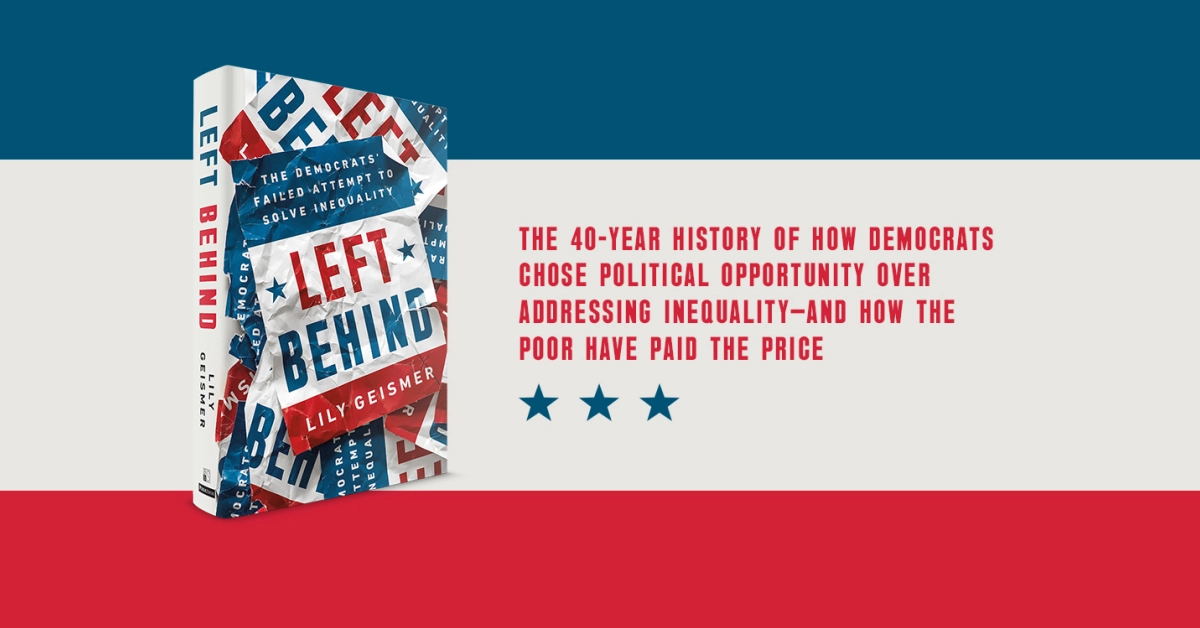Lily Geismer’s Left Behind offers an in depth history of the Democratic Party through the final decades of the last century, recounting the emergence of the New Democrats, who worked to restructure the party and eventually were handed the responsibility of governing during the presidency of Bill Clinton.
Determined to move away from the legacy of the New Deal and the Great Society, the New Democrats formed the Democratic Leadership Council and focused on creating “market based solutions” in an attempt to address economic disparities and racial inequality. These solutions proved to be widely ineffective as well as exclusive, empowering a few while keeping far more trapped in poverty.
The DLC believed that focusing on microenterprise would be more effective than direct cash assistance (using, for example, small business loans, like those from the Good Faith Fund). Shorebank, a bank formed in the southside of Chicago, became Clinton’s “gold standard” for microenterprise.
The founders of Shorebank sought to use private capital to rebuild communities in Chicago that had been suffering for decades. They contended that providing loans that promoted self-employment would arguably empower the impoverished and create a “win-win” situation between large investors and hurting communities.
Bill Clinton, who at the time was the governor of Arkansas, was so impressed by Shorebank’s early successes that he sought to adopt similar policies in his home state. But early attempts by Clinton to adapt microenterprise policies for use in Arkansas did not yield the results Clinton desired for the state’s communities.
Coming into the 1992 presidential election, the DLC decided the best approach to secure victory for the Democratic Party would be to appeal to white biconceptual swing voters. The DLC worked to promote a “core faith in growth over redistribution and financial incentives over cash assistance.”
The labor movement criticized this strategy and argued that unions and lower income families would suffer from the party’s appeal to white swing voters. In the run-up to the election, the DLC made a conscious effort to disassociate Democratic candidates from labor unions and progressive leaders.

Clinton himself delivered speeches in front of the DLC promoting these ideas. In a memorable speech, he called for new laws making it harder to obtain public assistance and toughening penalties for violations of criminal statutes — two pillars of his agenda that he would later call the “New Covenant.”
Continuing his campaign agenda as President, Clinton sought to create a Shorebank in every impoverished community.
Before long, the administration realized the task of creating hundreds of community investment banks was unachievable.
But Clinton still wanted to establish a way for large scale investors to, “[do] well by doing good.” He attempted to set up both Empowerment Zones and the Community Reinvestment Act, which “were poised to make little difference in the lives of the vast majority of people living in economically distressed areas.”
Clinton’s agenda eventually culminated in the 1996 Welfare Act, “which fulfilled Bill Clinton’s campaign to ‘end welfare as we know it.’ ”
By cutting welfare assistance and overestimating market based solutions, Clinton and Republicans in Congress left hundreds of thousands of American families without assistance or access to credit. The idea that turning to markets was the recipe for lifting people out of poverty was shown to be a failure.
Applying the same agenda to public housing, the Housing Opportunities for People Everywhere (HOPE VI) plan was adopted by the administration in order to completely restructure the nation’s public housing systems. In order to make impoverished areas more profitable, the plan called for demolishing public housing projects to make room for new projects overseen by private developers.
This resulted in thousands of people being displaced. The project planners incorrectly and irresponsibly assumed that people would find housing elsewhere. Housing was closely tied with “tough on crime” policies by restricting criminals and their families from accessing public housing. The “One Strike You’re Out” policy required convicted felons and their families to be immediately evicted.
These policies disproportionately impacted Black communities.
As the incarceration rate of Black people tripled in the 1990s, Black families were unable to find housing elsewhere as landlords consistently discriminated against the Black community and those using Section 8 vouchers.
At the same time, public education dollars began to be increasingly diverted to charter schools. Strong protests from unions like NEA and AFT were unsuccessful in preventing elected officials from steering money into privately run schools that were supposed to improve outcomes for students and reducing inequity, but ended up simply draining resources away from public schools.
Looking back on the Clinton administration and the New Democrats allows readers to see just how significantly these policies shaped the current political climate and the Democratic Party. Left Behind provides a thorough examination of the party’s trajectory from the Great Society to the twenty-first century.
As someone who was not alive during the Clinton administration, I found this book to be particularly captivating, often shedding light the origin of policy positions espoused by prominent Democratic leaders today.
Geismer provides in-depth background on cabinet members and other key party leaders, both well known and not so well known.
The ineffectiveness of the DLC’s policies is discussed in the concluding chapters, where Geismer offers disheartening evidence that Clinton Era “Empowerment Zones” are facing even higher levels of poverty today than they were in 1990.
Focusing on stoking economic growth rather providing assistance directly to people experiencing poverty left many Americans with little to no resources during the pandemic, a time when economic inequality continued to rise.
Geismer persuasively argues the Democratic Party must step up and champion a more appropriate balance between the public and the private.
Left Behind won’t be enthusiastically received in some quarters. Writing for The Washington Post, David Greenberg has compiled a list of what he considers to be holes in the book, which you can read here. Timothy Noah, meanwhile, had a much more favorable take on the book for The New York Times.
Democrats need to strengthen the country’s social contract in order to properly support those who have been left behind. The party began to do that with the American Rescue Plan last year, but President Biden’s proposed Build Back Better Act ran smack into West Virginia’s Joe Manchin in the United States Senate.
Reviving part or all of Build Back Better before the midterms will be of vital importance if the Democratic Party is to avoid repeating the mistakes of the past.

